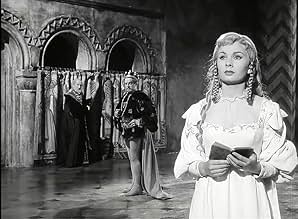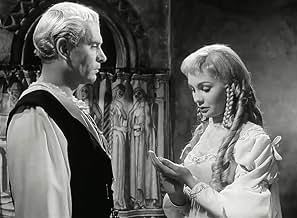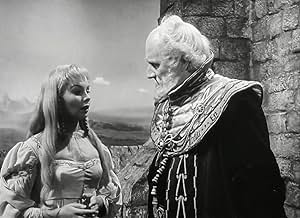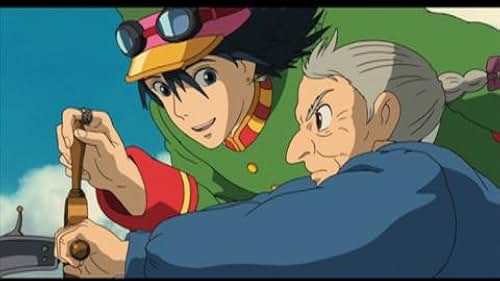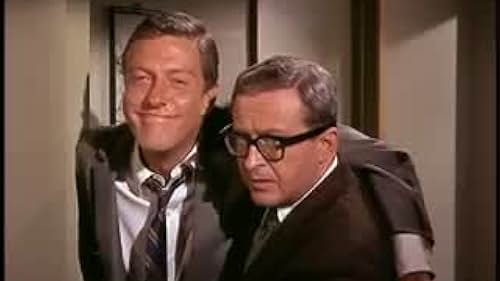Jean Simmons(1929-2010)
- Actress
- Soundtrack
Demure British beauty Jean Simmons was born January 31, 1929, in Crouch End, London. As a 14-year-old dance student, she was plucked from her school to play Margaret Lockwood's precocious sister in Give Us the Moon (1944). She had a small part as a harpist in the high-profile Caesar and Cleopatra (1945), produced by Gabriel Pascal, starring Vivien Leigh, and co-starring her future husband Stewart Granger. Pascal saw potential in Simmons, and in 1945 he signed her to a seven-year contract to the J. Arthur Rank Organization, and she went on to make a name for herself in such major British productions as Great Expectations (1946) (as the spoiled, selfish Estella), Black Narcissus (1947) (as a sultry native beauty), Hamlet (1948) (playing Ophelia to Laurence Olivier's great Dane and earning a Best Supporting Actress Oscar nomination), The Blue Lagoon (1949) and So Long at the Fair (1950), among others.
In 1950, she married Stewart Granger, and that same year, she moved to Hollywood. While Granger was signed to Metro-Goldwyn-Mayer, Rank sold her contract to Howard Hughes, who then owned RKO Pictures. Hughes was eager to start a sexual relationship with Simmons, but Granger put a stop to his advances. Her first Hollywood film was Androcles and the Lion (1952), produced by Pascal and co-starring Victor Mature. It was followed by Angel Face (1952), directed by Otto Preminger with Robert Mitchum. To further punish Simmons and Granger, Hughes refused to lend her to Paramount, where William Wyler wanted to cast her in the female lead for his film Roman Holiday (1953); the role made a star of Audrey Hepburn. A court case freed Simmons from the contract with Hughes in 1952. They settled out of court; part of the arrangement was that Simmons would do one more film for no additional money. Simmons also agreed to make three more movies under the auspices of RKO, but not actually at that studio - she would be lent out. MGM cast her in the lead of Young Bess (1953) playing a young Queen Elizabeth I with Granger. She went back to RKO to do the extra film under the settlement with Hughes, titled Affair with a Stranger (1953) with Mature; it flopped.
Simmons went over to 20th Century Fox to play the female lead in The Robe (1953), the first CinemaScope movie and an enormous financial success. Less popular was The Actress (1953) at MGM alongside Spencer Tracy, despite superb reviews; it was one of her personal favorites. Fox asked Simmons back for The Egyptian (1954), another epic, but it was not especially popular. She had the lead in Columbia's A Bullet Is Waiting (1954). More popular with moviegoers was Désirée (1954), where Simmons played Désirée Clary to Marlon Brando's Napoleon Bonaparte. Simmons and Granger returned to England to make the thriller Footsteps in the Fog (1955). She then starred in the musical Guys and Dolls (1955) with Brando and Frank Sinatra; she used her own singing voice and earned her first Golden Globe Award. Simmons played the title role in Hilda Crane (1956) at Fox, a commercial failure. So, too, were This Could Be the Night (1957) and Until They Sail (1957), both at MGM. Simmons had a big success, though, in The Big Country (1958), directed by Wyler. She starred in Home Before Dark (1958) at Warner Bros. and This Earth Is Mine (1959) with Rock Hudson at Universal.
Simmons divorced Granger in 1960 and almost immediately married writer-director Richard Brooks, who cast her as Sister Sharon opposite Burt Lancaster in Elmer Gantry (1960), a memorable adaptation of the Sinclair Lewis novel. That same year, she co-starred with Kirk Douglas in Stanley Kubrick's Spartacus (1960) and played a would-be homewrecker opposite Cary Grant in The Grass Is Greener (1960).
Off the screen for a few years, Jean captivated moviegoers with a brilliant performance as the mother in All the Way Home (1963), a literate, tasteful adaptation of James Agee's "A Death in the Family". However, after that, she found quality projects somewhat harder to come by, and took work in Life at the Top (1965), Mister Buddwing (1966), Divorce American Style (1967), Rough Night in Jericho (1967), The Happy Ending (1969) (a Richard Brooks film for which she was again Oscar-nominated, this time as Best Actress).
Jean continued making films well into the 1970s. In the 1980s, she appeared mainly in television miniseries, such as North & South: Book 1, North & South (1985) and The Thorn Birds (1983). She made a comeback to films in 1995 in How to Make an American Quilt (1995) co-starring Winona Ryder and Anne Bancroft, and most recently voiced the elderly Sophie in the English version of Hayao Miyazaki's Howl's Moving Castle (2004). She now resided in Santa Monica, California, with her dog, Mr. Gates, and her two cats, Adisson and Megan. Jean Simmons died of lung cancer on January 22, 2010, nine days before her 81st birthday.
In 1950, she married Stewart Granger, and that same year, she moved to Hollywood. While Granger was signed to Metro-Goldwyn-Mayer, Rank sold her contract to Howard Hughes, who then owned RKO Pictures. Hughes was eager to start a sexual relationship with Simmons, but Granger put a stop to his advances. Her first Hollywood film was Androcles and the Lion (1952), produced by Pascal and co-starring Victor Mature. It was followed by Angel Face (1952), directed by Otto Preminger with Robert Mitchum. To further punish Simmons and Granger, Hughes refused to lend her to Paramount, where William Wyler wanted to cast her in the female lead for his film Roman Holiday (1953); the role made a star of Audrey Hepburn. A court case freed Simmons from the contract with Hughes in 1952. They settled out of court; part of the arrangement was that Simmons would do one more film for no additional money. Simmons also agreed to make three more movies under the auspices of RKO, but not actually at that studio - she would be lent out. MGM cast her in the lead of Young Bess (1953) playing a young Queen Elizabeth I with Granger. She went back to RKO to do the extra film under the settlement with Hughes, titled Affair with a Stranger (1953) with Mature; it flopped.
Simmons went over to 20th Century Fox to play the female lead in The Robe (1953), the first CinemaScope movie and an enormous financial success. Less popular was The Actress (1953) at MGM alongside Spencer Tracy, despite superb reviews; it was one of her personal favorites. Fox asked Simmons back for The Egyptian (1954), another epic, but it was not especially popular. She had the lead in Columbia's A Bullet Is Waiting (1954). More popular with moviegoers was Désirée (1954), where Simmons played Désirée Clary to Marlon Brando's Napoleon Bonaparte. Simmons and Granger returned to England to make the thriller Footsteps in the Fog (1955). She then starred in the musical Guys and Dolls (1955) with Brando and Frank Sinatra; she used her own singing voice and earned her first Golden Globe Award. Simmons played the title role in Hilda Crane (1956) at Fox, a commercial failure. So, too, were This Could Be the Night (1957) and Until They Sail (1957), both at MGM. Simmons had a big success, though, in The Big Country (1958), directed by Wyler. She starred in Home Before Dark (1958) at Warner Bros. and This Earth Is Mine (1959) with Rock Hudson at Universal.
Simmons divorced Granger in 1960 and almost immediately married writer-director Richard Brooks, who cast her as Sister Sharon opposite Burt Lancaster in Elmer Gantry (1960), a memorable adaptation of the Sinclair Lewis novel. That same year, she co-starred with Kirk Douglas in Stanley Kubrick's Spartacus (1960) and played a would-be homewrecker opposite Cary Grant in The Grass Is Greener (1960).
Off the screen for a few years, Jean captivated moviegoers with a brilliant performance as the mother in All the Way Home (1963), a literate, tasteful adaptation of James Agee's "A Death in the Family". However, after that, she found quality projects somewhat harder to come by, and took work in Life at the Top (1965), Mister Buddwing (1966), Divorce American Style (1967), Rough Night in Jericho (1967), The Happy Ending (1969) (a Richard Brooks film for which she was again Oscar-nominated, this time as Best Actress).
Jean continued making films well into the 1970s. In the 1980s, she appeared mainly in television miniseries, such as North & South: Book 1, North & South (1985) and The Thorn Birds (1983). She made a comeback to films in 1995 in How to Make an American Quilt (1995) co-starring Winona Ryder and Anne Bancroft, and most recently voiced the elderly Sophie in the English version of Hayao Miyazaki's Howl's Moving Castle (2004). She now resided in Santa Monica, California, with her dog, Mr. Gates, and her two cats, Adisson and Megan. Jean Simmons died of lung cancer on January 22, 2010, nine days before her 81st birthday.



